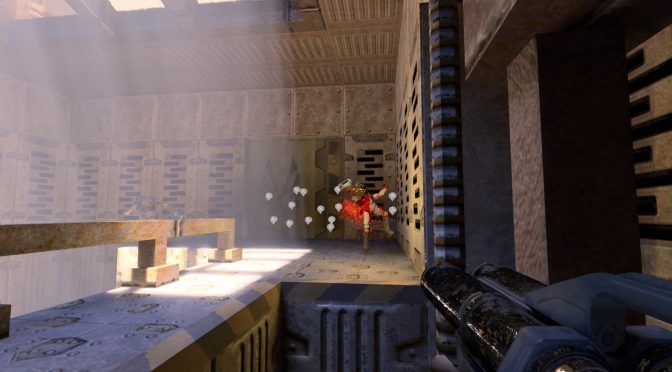NVIDIA has released a new update for Quake 2 RTX that adds support for platform-agnostic Vulkan Ray Tracing. This basically means that Quake 2 RTX is no longer locked on NVIDIA’s hardware. Instead, this fully path-traced game can now run on all GPUs that support the latest Vulkan Ray Tracing extensions.
According to some early reports, the new Vulkan Ray Tracing extensions also bring some performance improvements to NVIDIA’s GPUs as well.
Quake II RTX was the world’s first game that is fully path-traced. This ray-tracing technique unifies all lighting effects such as shadows, reflections, refractions and more into a single ray-tracing algorithm.
Now as I’ve already said, I still consider Quake 2 RTX as one of the most impressive Ray Tracing games. It truly is a beauty to behold. Not only that, but NVIDIA has created a studio in order to overhaul with RT effects other classic games. Thus, I can’t wait to see what other classic games NVIDIA will overhaul. I’d personally love to see Unreal Classic and Doom 3 with full Ray Tracing effects.
Below you can also find the complete changelog for this latest update.
Quake 2 RTX Patch 1.4.0 Release Notes
New Features:
- Added support for final Vulkan Ray Tracing API. The game can now run on any GPU supporting `VK_KHR_ray_tracing_pipeline` extension
- Added temporal upscaling, or TAAU, for improved image quality at lower resolution scales.
Fixed Issues:
- Fixed a crash that happened when there are no available sound devices.
- Also fixed a few issues with the tone mapper and the profiler for AMD GPU compatibility.
- Also fixed a server crash: https://github.com/NVIDIA/Q2RTX/issues/86
- Fixed black materials and some light leaks: https://github.com/NVIDIA/Q2RTX/issues/55
- Fixed missing railgun lights in photo mode: https://github.com/NVIDIA/Q2RTX/issues/75
- Also fixed missing sun light on geometry with invalid clusters.
- Fixed the CFLAGS for MinSizeRel and RelWithDebInfo builds to generate correct debug symbols.
- Fixed the game stuttering on Linux: https://github.com/NVIDIA/Q2RTX/issues/62
- Also fixed the issue with all models being missing or corrupted on some maps during network play.
- Fixed the nearest filter when DRS was enabled and then disabled.
- Fixed building the game with GCC10 on Linux: https://github.com/NVIDIA/Q2RTX/issues/80
Denoiser Improvements:
- Implemented a new gradient estimation algorithm that makes the image more stable in reflections and refractions.
- Implemented sampling across checkerboard fields in the temporal filter to reduce blurring.
- Improved motion vectors for multiple refraction, in particular when thick glass is present.
- Improved the temporal filter to avoid smearing on surfaces that appear at small glancing angles, e.g. on the floor when going up the stairs.
- Also improved the temporal filter to make lighting more stable on high-detail surfaces.
Misc Improvements:
- Added git branch name to the game version info.
- Improved the console log to get more information in case of game crashes.
- Increased precision of printed FPS when running timedemos.
- Reduced the amount of stutter that happened when the game loads new geometry, like on weapon pickup.
- Replaced the Vulkan headers stored in the repository with a submodule pointing to https://github.com/KhronosGroup/Vulkan-Headers
- Static resolution scale can now be set to as low as 25%.
- Vulkan validation layer can now be enabled through the `vk_validation` cvar.
- Updated SDL2 version to changeset 13784.

John is the founder and Editor in Chief at DSOGaming. He is a PC gaming fan and highly supports the modding and indie communities. Before creating DSOGaming, John worked on numerous gaming websites. While he is a die-hard PC gamer, his gaming roots can be found on consoles. John loved – and still does – the 16-bit consoles, and considers SNES to be one of the best consoles. Still, the PC platform won him over consoles. That was mainly due to 3DFX and its iconic dedicated 3D accelerator graphics card, Voodoo 2. John has also written a higher degree thesis on the “The Evolution of PC graphics cards.”
Contact: Email

